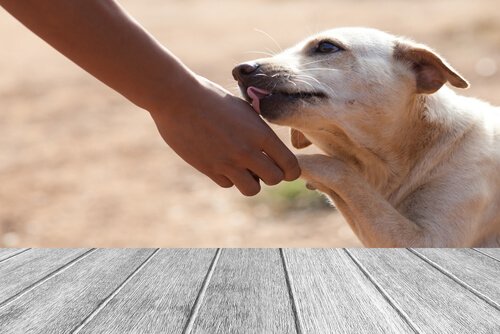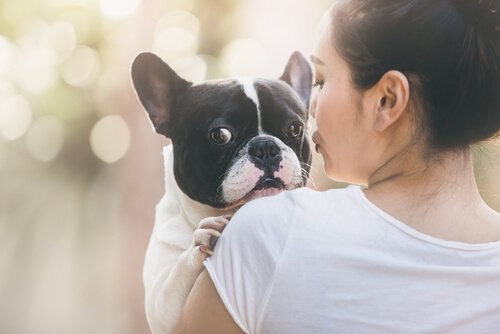Buying a Dog: Risks of Buying From Individuals


Written and verified by the lawyer Francisco María García
Among the main risks of buying a dog from a private individual is that often you’re paying for false pedigrees or for a sick animal.
Getting a dog from a private seller can result in dangers that you should be aware of. There are several risks associated with buying and selling animals. Among them is the possible exploitation of dogs for breeding.
Often, clients are paying large sums of money for a pedigree that isn’t what it seems. This article explains the risks of buying a dog from private sellers and some guidelines to avoid them.
Health risks when buying a dog

When you adopt a puppy, you need to know about the special care they require, such as anti-parasitics, vaccines, and checkups. However, if you don’t take these factors into consideration, the puppy’s health could be affected.
Therefore, it’s important that the seller or person who’s giving you a dog is an accredited breeder, animal shelter, or professional.
However, just because you get an animal from a private individual doesn’t guarantee that the animal has received proper health care. Keep in mind that if the individual isn’t licensed, then they’re not recognized for commercial activity. Therefore, these individuals don’t have the same requirements as professional breeders or authorized establishments that sell animals.
The situation in Spain
Throughout Spain, there are more than 5,000 pet shops. These businesses have the obligation to meet certain requirements, such as correct hygienic and sanitary conditions for the animals.
However, individuals who raise dogs in their homes don’t have to follow these standards. This is because they aren’t subject to the standards of authorized establishments.
Making claims after buying a dog
As in many other purchases, if you aren’t given a receipt when you purchased the animal, you can’t make a claim if it’s necessary. The animal might be sick or even die days after you purchase it due to certain illnesses.
When it comes to authorized establishments, purchasing an animal usually involves a 15-day guarantee. During this period, if the animal becomes ill or dies, the buyer can get a refund.
However, there can be illnesses that appear 15 days after the purchase. By then, it’s more difficult to establish a claim.
Excessive breeding of animals
There are breeders that exploit female dogs to excessive breeding in order to obtain more puppies. Especially when you buy animals without a guarantee, you are promoting the business and this type of exploitation.
Frauds and pedigrees
As you can see, the number of frauds when buying a dog with a certain breed or pedigree is more frequent than you would think. One of the ways to avoid this scam is to request DNA tests to determine who the parents are and the dog’s origin.
Also, purchasing an animal doesn’t prevent abandonment. Adopting a dog is a good option because, in some countries, such as Spain, there are 110,000 abandoned dogs each year. Therefore, it doesn’t make much sense to buy a dog when there is a large population of abandoned animals in shelters.
Tips on what to avoid when buying a dog

- Know the animal’s origins. As you’ve seen, we recommend knowing where the animal comes from.
- Talk to the breeder to get all the information about the animal.
- If your animal is of a certain breed, do some research about the particularities of the breed.
- Evaluate the facilities where the litter lives and check if it’s hygienic and sanitary. This is a good way to know if the breeder is professional and responsible with the animals that they breed and sell.
- You can also consider collecting a DNA sample and checking the origin of your pet. Simply take a cotton swab and rub it in the inner area of the animal’s cheek to collect cells that contain DNA. It’s safe and painless for the dog. This DNA sample contians genetic information. For example, if the dog comes from more than one breed. In all cases, some breed will be dominate than the other and the dog will more closely resemble this breed physically and emotionally.
Among the main risks of buying a dog from a private individual is that often you’re paying for false pedigrees or for a sick animal.
Getting a dog from a private seller can result in dangers that you should be aware of. There are several risks associated with buying and selling animals. Among them is the possible exploitation of dogs for breeding.
Often, clients are paying large sums of money for a pedigree that isn’t what it seems. This article explains the risks of buying a dog from private sellers and some guidelines to avoid them.
Health risks when buying a dog

When you adopt a puppy, you need to know about the special care they require, such as anti-parasitics, vaccines, and checkups. However, if you don’t take these factors into consideration, the puppy’s health could be affected.
Therefore, it’s important that the seller or person who’s giving you a dog is an accredited breeder, animal shelter, or professional.
However, just because you get an animal from a private individual doesn’t guarantee that the animal has received proper health care. Keep in mind that if the individual isn’t licensed, then they’re not recognized for commercial activity. Therefore, these individuals don’t have the same requirements as professional breeders or authorized establishments that sell animals.
The situation in Spain
Throughout Spain, there are more than 5,000 pet shops. These businesses have the obligation to meet certain requirements, such as correct hygienic and sanitary conditions for the animals.
However, individuals who raise dogs in their homes don’t have to follow these standards. This is because they aren’t subject to the standards of authorized establishments.
Making claims after buying a dog
As in many other purchases, if you aren’t given a receipt when you purchased the animal, you can’t make a claim if it’s necessary. The animal might be sick or even die days after you purchase it due to certain illnesses.
When it comes to authorized establishments, purchasing an animal usually involves a 15-day guarantee. During this period, if the animal becomes ill or dies, the buyer can get a refund.
However, there can be illnesses that appear 15 days after the purchase. By then, it’s more difficult to establish a claim.
Excessive breeding of animals
There are breeders that exploit female dogs to excessive breeding in order to obtain more puppies. Especially when you buy animals without a guarantee, you are promoting the business and this type of exploitation.
Frauds and pedigrees
As you can see, the number of frauds when buying a dog with a certain breed or pedigree is more frequent than you would think. One of the ways to avoid this scam is to request DNA tests to determine who the parents are and the dog’s origin.
Also, purchasing an animal doesn’t prevent abandonment. Adopting a dog is a good option because, in some countries, such as Spain, there are 110,000 abandoned dogs each year. Therefore, it doesn’t make much sense to buy a dog when there is a large population of abandoned animals in shelters.
Tips on what to avoid when buying a dog

- Know the animal’s origins. As you’ve seen, we recommend knowing where the animal comes from.
- Talk to the breeder to get all the information about the animal.
- If your animal is of a certain breed, do some research about the particularities of the breed.
- Evaluate the facilities where the litter lives and check if it’s hygienic and sanitary. This is a good way to know if the breeder is professional and responsible with the animals that they breed and sell.
- You can also consider collecting a DNA sample and checking the origin of your pet. Simply take a cotton swab and rub it in the inner area of the animal’s cheek to collect cells that contain DNA. It’s safe and painless for the dog. This DNA sample contians genetic information. For example, if the dog comes from more than one breed. In all cases, some breed will be dominate than the other and the dog will more closely resemble this breed physically and emotionally.
This text is provided for informational purposes only and does not replace consultation with a professional. If in doubt, consult your specialist.








